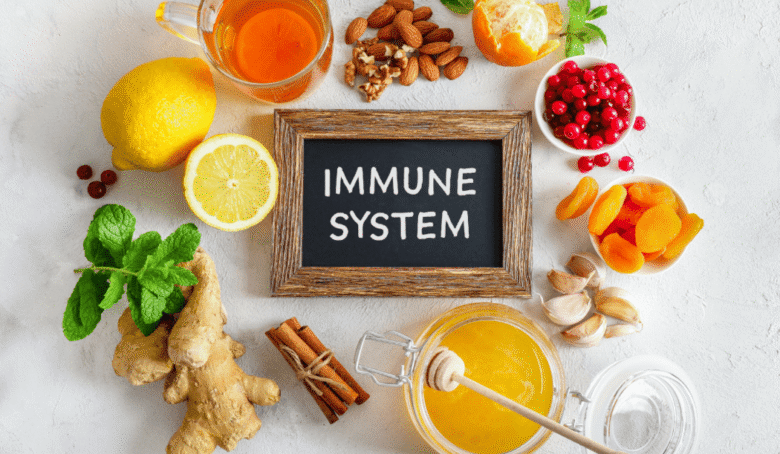This is a crucial time to maintain a healthy immune system. Pollution, stress, and fast food are all part of modern life. As the body’s protective shield, the immune system protects you from infections, viruses, and long-term illnesses. While medications and supplements can help, the best way to strengthen your immune system is to nourish and improve your body from within with natural means. Nature provides everything we need to stay healthy: nutritious food, adequate rest, exercise, and a calm mind. A strong immune system doesn’t develop overnight; it requires consistent, well-considered choices. This article discusses some proven natural ways to strengthen your immune system. These methods will help you live a better, healthier, and more vital life every day.
How the Immune System Works:
The immune system consists of many cells, tissues, and glands that work together to protect the body from pathogens such as bacteria, viruses, and toxins. It consists of white blood cells, antibodies, and the lymphatic system. These components play various roles in detecting and defending against threats. When the immune system is functioning optimally, it prevents the spread of germs and ensures rapid recovery.
However, poor nutrition, lack of sleep, chronic stress, and environmental toxins can weaken this protective effect. To naturally strengthen your immune system, you need to take care of these important building blocks through a healthy diet, exercise, mental well-being, and adequate rest. This process creates an environment in your body where it can thrive and protect itself.
How Food Boosts Your Immunity:
To maintain a strong immune system, you need a healthy and balanced diet. The food we eat directly affects our body’s ability to fight infection and heal. Minerals and vitamins, such as zinc, selenium, iron, and vitamins A, C, D, and E, are important for overall health. Berries, citrus fruits, spinach, and bell peppers are rich in antioxidants. These antioxidants help reduce inflammation and combat cell-damaging free radicals.
Gut health is closely linked to immunity, and foods rich in probiotics, such as yogurt, kefir, and fermented vegetables, can improve gut health. Harvard Health notes that the gut houses approximately 70% of the immune system, indicating that maintaining a balanced gut flora is crucial. Avoiding processed foods, refined sugars, and harmful fats can also help strengthen the immune system. Eating nutrient-rich, unprocessed foods can boost the body’s natural defenses and reduce the risk of disease.
The Role of Physical Activity in Immune Health:
One of the best natural ways to boost your immune system is exercise. Regular exercise improves circulation, allowing immune cells to move more easily throughout the body and detect pathogens more quickly. Light exercise, such as walking, cycling, yoga, or swimming, has been shown to reduce inflammation and the risk of chronic disease. On the other hand, excessive or strenuous exercise without giving your body time to recover can weaken your immune system.
Maintaining a balance is essential, meaning you need to exercise regularly and moderately to keep your body moving but not overly fatigued. Exercise also produces endorphins, chemicals that help lower stress hormones, which can weaken your immune system. Exercising for at least 30 minutes a day makes you stronger and helps you sleep, digest food, and think more clearly—all crucial for maintaining a healthy immune system.
How to Get Enough Sleep and Manage Stress:
Stress and lack of sleep are two of the most overlooked factors that can harm your immune system. Cytokines are proteins that help the immune system fight infection. Lack of sleep hinders the production of these proteins. Chronic sleep deprivation makes it easier for viruses to infect the body, making people more susceptible to illness. For optimal health, experts recommend getting 7 to 9 hours of uninterrupted sleep every night. Uncontrolled stress can also lead to elevated cortisol levels, which weaken the immune system and cause inflammation.
Meditation, deep breathing, yoga, and spending time in nature are all natural ways to relieve stress and promote a sense of well-being. The American Psychological Association states that mindfulness practices can significantly reduce stress and boost the immune system. Prioritizing rest isn’t just an option; it’s essential for maintaining a healthy immune system.
Hydration and Detoxification for Immunity:
Water is essential for a healthy immune system and overall health. Staying hydrated helps the body eliminate waste, transport nutrients, and keep mucous membranes moist, preventing the spread of disease. However, dehydration can make you feel worn out and slow down your immune system’s response. Herbal teas, coconut water, and water-rich vegetables like oranges and cucumbers can help you stay hydrated. A diet rich in fruits, vegetables, and fiber also helps the liver and kidneys function better, naturally flushing out harmful toxins. Lemon water, green tea, and antioxidant-rich foods help cleanse the body. Staying hydrated is an important part of overall health because it strengthens the immune system and improves digestion, skin health, and energy.
Vitamin D, Sunlight, and a Healthy Immune System:
Sunlight exposure is one of the best and most natural ways to strengthen your immune system. Vitamin D is produced when sunlight hits your skin. Vitamin D is an important nutrient for maintaining immune cell function. Because vitamin D helps the body recognize and fight pathogens, they are less likely to cause respiratory infections and autoimmune diseases. However, many people today don’t get enough vitamin D because they spend so much time indoors. Just 15-20 minutes of natural sunlight exposure per day can significantly boost your vitamin D levels.
Vitamin D-rich foods, such as oily fish, mushrooms, and fortified cheese, can help people who don’t get enough sunlight. According to a study published in the journal Nature Reviews Immunology, adequate vitamin D intake can strengthen both the innate and adaptive immune systems. One of the simplest and most natural ways to keep your immune system strong year-round is to get more sunlight.
Conclusion:
There are no quick fixes or magic supplements to naturally boost your immunity. Instead, you should live a balanced and healthy lifestyle that supports your body’s natural defenses. Your immune system will be stronger if you eat whole foods, stay active, get enough rest, manage stress, and enjoy the sunshine. Small, well-considered choices, like drinking more water or spending more time outdoors, will benefit your long-term health. Your immune system protects you throughout your life, and how you care for it determines whether you can better fight illness and live a fulfilling life. Remember: perseverance is the first step to prevention, and nature has already given you everything you need to survive. If you start today, your body will thank you for years to come.
FAQs:
1. What natural foods can help you stay healthier this winter?
Citrus fruits, spinach, yogurt, and nuts are all excellent foods rich in zinc, antioxidants, probiotics, and vitamins C, D, and E.
2. How does exercise help your immune system function better?
Regular, light exercise can improve circulation, reduce stress hormones, and make it easier for immune cells to detect and fight infections throughout the body.
3. Does lack of sleep weaken the immune system?
Yes, lack of sleep can disrupt proteins like cytokines that regulate the immune system. This can make the body more susceptible to infections and delay recovery.
4. What role does vitamin D play in maintaining optimal health?
Vitamin D promotes the function of immune cells, helps protect the body against viruses and bacteria, and reduces the risk of autoimmune and respiratory diseases.
5. How can you manage stress healthily and strengthen your immune system?
Meditation, deep breathing, regular exercise, and spending time in nature are all good ways to lower your cortisol levels and keep your immune system balanced.




